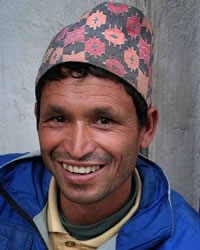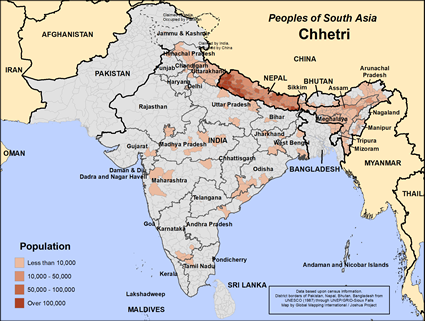The name Chettri is based on the word warrior. At one time they migrated to India from Nepal, though many still live in Nepal. They speak Nepali, which defines them as a community. Some consider them to be one of the Rajput groups. Chhetri identity and status is nearly identical to the Kshatriya, the second highest caste grouping in the Hindu world.
A high percentage of military and police officers in Nepal and India are from the Chhetri community. That does not mean all are in the armed forces. Some are landowners who hire people from lower status communities to work their fields. Absentee land ownership is common; many Chhetris live in cities but use their land as an income source. Other than a dowry, daughters don't get an inheritance with most Chhetri families. Through the generations, smaller parcels of land have been inherited by sons.
Urban, educated Chhetris get married later than their rural counterparts. Whom they marry is determined by a couple of factors. The spouse must be from the same or a similar community so they don't lose status as a family. Partly for this reason, parents arrange marriages. Astrologers have a say in when the wedding should be. Weddings last an entire day and sometimes even more.
Nepal's prime ministers and others in the high level of government are often from a Chhetri background. That indicates the power Chhetris have in Nepal.
After the marriage, the couple stays with the groom's family. That family includes his siblings and parents. The new bride takes a low position in the family, and she is often at odds with her mother-in-law. The bride's status rises after she has given birth to the first child, especially if it's a son.
Forward caste Hindus such as the Chhetri in Nepal believe in dharma, which means staying faithful to their prescribed role. In their case, this means serving as defenders. Very few would dare to look outside of the Hindu world for spiritual answers.
Hinduism is a catch-all phrase for the local religions of South Asia, so it is very diverse. At the popular level, Hindus worship and serve the gods of the Hindu pantheon. They visit Hindu temples and offer prayers, food, flowers, and incense to their gods in hopes of gaining protection and benefits. They do not have a personal or familial relationship with their gods like Christians or Jews. There are other Hindus who are much more philosophical. That approach is much more common for forward caste groups.
Almost all Hindus participate in yearly celebrations like Holi, the festival of colors and the start of spring / Diwali, the festival of lights / Navratri, the celebration of autumn / and Rama Navami, Rama's birthday.
Christianity is looked at as a "foreigners" religion by high status communities in Nepal like the Chhetri. They will probably lose that status if they put their faith in Jesus Christ. For that reason, very few will consider putting their faith in Christ.
Pray that God will encourage and strengthen the Nepali Christ followers and use them to reach all forward caste communities in Nepal.
Pray that soon there will be Chhetri disciples making more disciples throughout Nepal.
Pray for Nepal's Chhetris to have the spiritual hunger it takes to embrace Christ no matter what the social cost may be.
Scripture Prayers for the Chhetri in Nepal.
https://www.encyclopedia.com/humanities/encyclopedias-almanacs-transcripts-and-maps/brahman-and-chhetri-nepal
https://www.tipsnepal.com/chhetri-the-most-populas-caste-of-nepal/
https://www.reddit.com/r/Nepal/comments/bw4zo3/what_is_chhetri_culture_in_nepal/
https://nationalmuseum.gov.np/archives/112
| Profile Source: Joshua Project |












